Occupy Central
Occupy Central is a civil disobedience movement which began in Hong Kong on September 28, 2014. It calls on thousands of protesters to block roads and paralyse Hong Kong's financial district if the Beijing and Hong Kong governments do not agree to implement universal suffrage for the chief executive election in 2017 and the Legislative Council elections in 2020 according to "international standards." The movement was initiated by Benny Tai Yiu-ting, an associate professor of law at the University of Hong Kong, in January 2013.
OCCUPY CENTRAL - DAY 36: Full coverage of the day’s events
Police probe vandalism to memorial plaque for dead air service crewmen
PUBLISHED : Sunday, 02 November, 2014, 6:08am
The plaque honours pilot Peter Pang Fu-kwok and crewman Dickson Chan Man-tik, who died on duty in 2003.
Police are investigating after pro-democracy messages were daubed on a memorial to two Government Flying Service crewmen who died on duty in 2003.
The head of the service, Captain Michael Chan Chi-pui, confirmed staff removed red Chinese characters from the metal plaque at Pak Kung Au mountain pass on Lantau Island after reporting the matter to police. The phrases, "I want real universal suffrage" and, "689, step down" - a reference to Chief Executive Leung Chun-ying - appeared on Wednesday.
It is not known whether those responsible for desecrating the memorial are Occupy Central supporters and it is unclear why the monument was targeted. The service provides aerial support for the police and was involved in removing a pro-Occupy banner from Lion Rock last month.
The plaque honours pilot Peter Pang Fu-kwok, 34, and crewman Dickson Chan Man-tik, 31, whose helicopter crashed close to the pass while heading to airlift three patients from Cheung Chau on August 26, 2003.
The Lantau district crime squad is investigating the case as criminal damage.
A day after the graffiti was found, the four unions representing the service's pilots, crewmen, technicians and engineers issued a joint statement condemning those responsible.
In a letter signed by the union leaders, they described the vandalism as "an act of disrespect not only for [the deceased], but also for their family members and colleagues".
"We hope that members of the public, when airing their views, will think from the perspective of other people. We also hope that they will do so in a legal, reasonable and practical manner," the statement said.
The union officials added that its members would continue to serve the Hong Kong people with the "civil servants' principle of political neutrality".
This article appeared in the South China Morning Post print edition as Memorial plaque vandalism probed
More bus firms seek injunctions to clear roads of Occupy protesters
PUBLISHED : Sunday, 02 November, 2014, 6:08am
The lawsuits, from firms linked to Kwoon Chung Bus, seek to stop protesters from preventing "normal vehicular traffic passing and repassing" specified streets in the areas.
Three subsidiaries of a bus company yesterday joined the legal battle against Occupy Central, filing writs with the High Court seeking injunctions to clear roads in Admiralty.
The lawsuits, from firms linked to listed Kwoon Chung Bus, seek to stop protesters from preventing "normal vehicular traffic passing and repassing" specified streets in the areas.
The court has already granted injunctions - ignored so far by the protesters - to taxi and minibus operators against protesters in Mong Kok and around Citic Tower near government headquarters in Admiralty.
In the latest writs, Kwoon Chung Motors asks the court to order protesters to clear the "portion of Cotton Tree Drive towards Mid-Levels". A company spokesman said its school bus services to Mid-Levels had been rerouted via Sai Ying Pun, adding an hour to commuting times.
Two other subsidiaries, All China Express (Wan Chai) and Chinalink Bus Company, filed writs to clear obstructions on parts of Connaught Road Central, Harcourt Road and Cotton Tree Drive.
Two bus operators' organisations, the Public Omnibus Operators Association and China, Hong Kong and Macau Boundary-Crossing Bus Association, applied for injunctions to clear barriers in parts of Admiralty on October 22, though that case has yet to be heard. Kwoon Chung is affiliated to both organisations.
On Monday, Mr Justice Au Hing-cheung reserved judgment on applications to keep in place the injunctions granted to Chiu Luen Public Light Bus Company, the Taxi Association and Taxi Drivers and Operators Association, and Goldon Investment until an unspecified date. The court order remains in place until his decision is made.
Occupy opponents have also been hit with an injunction. Next Media, owned by pro-democracy tycoon Jimmy Lai Chee-ying, has won a court order against protesters attempting to block delivery of Apple Daily from the firm's Tseung Kwan O offices.
This article appeared in the South China Morning Post print edition as More injunctions sought to clear roads
Ups and downs of the brollie menders amid Umbrella Movement protests
PUBLISHED : Sunday, 02 November, 2014, 6:08am
Umbrella repairer So Yin-har has donated more than 100 umbrellas to the students in Admiralty. Photo: Sam Tsang
The humble umbrella's rise from an everyday object to the dizzying heights of political iconography over the tumultuous past five weeks has come as no surprise to Hong Kong's dwindling band of menders, who eke out a living fixing broken brollies in one of the world's most throwaway cities.
 Only a handful of them still exist, and if truth be told, they were on borrowed time. But the social and political upheaval that has rocked the city has given them a renewed profile.
Only a handful of them still exist, and if truth be told, they were on borrowed time. But the social and political upheaval that has rocked the city has given them a renewed profile.
For So Yin-har, a 15-year veteran of the business, the "umbrella movement" presented her with a once-in-a-lifetime chance to combine her love for an item most of us are happy to leave on the MTR with the spontaneous empathy she felt towards the students in Admiralty, to whom she has donated more than 100 umbrellas since the protests began.
That act by So - a mother in her 50s who describes herself as non-political - has been reciprocated by students taking their broken brollies to her shop for repair in the days and weeks since.
"The umbrella is designed to protect people, in its new incarnation, it is simply doing what it was designed to do. I can't bear the thought of the rain coming down on the children," she said, sitting among brollies of all shapes and sizes in her North Point shop. "I just think of the students like a mother would - and they are all very polite children."
Across the harbour in Sham Shui Po, fifth-generation umbrella maker and repairman Yau Yiu-wai sold 800 umbrellas to the protesters at a heavily discounted price. "What they're doing is for the whole of Hong Kong. I hope they can stay safe and stay unharmed from the pepper spray and tear gas," he said.
Self-taught So's little shop in a mall in Marble Road, North Point, is stacked with umbrellas. So repairs about 50 brollies a day - during the rainy season.
"No one enters this trade any more, it doesn't earn much. Also, it's still a trade requiring rough hands, so no woman will enter the trade," she said. High rents have also had an impact.
Most customers are long-term, fixing umbrellas for environmental reasons or not wanting to waste something. But So said she had also had many coming in with common-looking and not-so-good-quality umbrellas, fixing them for a price higher than the cost of the umbrella, for sentimental reasons.
"I had a man come in to fix an average-quality umbrella seven times. He said it had a special bond for him - and then I didn't dare ask more about the 'bond'," she said.
While some people adopt the generation's "fast food" ways, So said there were still enough people who think otherwise to keep her business going.
Mending a simple broken stem would cost about HK$50, with more complicated repairs costing HK$200 to HK$300, said Yau, 60.
Renowned as the city's oldest umbrella repairer, Ho Hung-hee - who was fixing them into his late 80s - has not opened his little street stall on Peel Street, Central for over a month.
Over the phone, his wife said "current weather is not good for business".
"Plus, with the Occupy thing going, it's really hard for him to get to his stall up there. We live across the harbour," she said.
This article appeared in the South China Morning Post print edition as Umbrella repairers have got Hong Kong covered
The students from Hong Kong who daren't voice open support for Occupy
Students careful who they talk to about pro-democracy protests on Guangzhou campus, where showing support risks widening gulf with mainland classmates
PUBLISHED : Sunday, 02 November, 2014, 6:08am
Occupy control
For Leo, one of about 5,000 Hongkongers studying at Jinan University in Guangzhou, the democracy movement feels achingly distant but its effects ripple through his daily campus life, widening the gulf with mainland students.
Leo often travels home on weekends to visit his family and has seen the street skirmishes up close.
He strongly supports the protest but, back on campus on weekdays, he's careful about how he shows his interest. He shares photos about the movement with mainland friends but they express little interest, he says.
Organising a social activity, even one as benign as a Christmas get-together, is frowned upon by the campus administration, so a gathering with a political bent is out of the question.
"Many of us [Hongkongers] support and understand the students who remain in Admiralty, Causeway Bay and Mong Kok," said Leo. "So far, we haven't felt a taboo on talking about it on campus. But the conversations are usually only among the Hong Kong students."
Jinan has the most international student body of any mainland university. Nearly a third of its 35,320 students come from Hong Kong, Macau, Taiwan or overseas countries.
While everyone may sit together in lecture halls, there are fault lines running through the social life of the campus. Hong Kong students say they are friendly with their mainland classmates but remain isolated. They live in separate dormitories, and immerse themselves online in their own media culture, dominated by TVB dramas and Hong Kong newspapers.
"We have different habits, experiences and beliefs compared with our classmates from the mainland. The mainland students are smart, practical and [rooted in realities]," said Alex, another Hong Kong student at Jinan. "They only care about job opportunities and preparing for civil servant exams or overseas studies."
In the eyes of some Hong Kong students, the Occupy movement has put into starker relief than ever the differences between them.
"Some are curious and come to ask what's happening in Hong Kong when they see the pictures we spread through WeChat," Leo said. "But they just view the movement as useless political and social unrest. They say 'take care', but that's it. Few want to know anything more about why so many young Hong Kong people have taken to the streets."
When approached for their opinion on the movement, two mainland students said it was best to call the propaganda office of the university.
To avoid becoming unpopular with classmates or teachers, the city's students consciously avoid taking a stance on Occupy, said Yau Chun-man, the head of the Hong Kong section of the Students' Union.
They would never consider putting up politics-themed artwork or posters in campus buildings. "After all, we are studying at a university in the mainland. It's not Hong Kong," Yau said. "Many of us just want to be neutral."
Jinan is a popular choice for Hongkongers seeking higher education. According to official data, about 70,000 high school pupils graduate in Hong Kong each year, but only about 25,000 find a place in the city's universities and colleges. Others are forced to go overseas or seek places in mainland universities.
The tuition and living costs on the mainland are affordable and parents like the relatively short time it takes their children to go home. The university is about 120km from Hong Kong.
Yau said it had always been hard for students from the city to get approval to hold any campus activities, let alone one expressing support for such a sensitive political movement.
"University authorities raised objections when we wanted to hold a Christmas party and introduce Hong Kong companies to recruit our graduates. We were told the activities were either 'too religious' or 'too commercial'. In the end, we had to repackage the events as a dance party and a Hong Kong alumni reunion party."
It's not unusual for science or business majors to pass over political affairs. But even in the university's journalism department, interest appears muted. "No one made it a homework topic or brought it for class discussion," said Fred, another student in the programme at Jinan.
"Some of our Hong Kong classmates used it for news-writing exercise, but never handed the pieces into teachers. We worry that it could be evidence against us in future.
"Students from the mainland say they do not have a channel to read or watch news from Hong Kong. But actually we are a good way for them to learn more. But few have come to us for the actual details," he said.
"They read state-run media editorials every day and hold opinions about the movement that are highly consistent with the authorities'.
"One of our teachers talked about the incident once in class for about a minute. He said the movement had badly damaged Hong Kong's economy and they had no right, reason or power against the central government," he said. "All the students from the mainland agreed with him."
Alex said he mostly avoided talking about the rallies on campus but he would argue his views with mainlanders in chat rooms.
"It's easy to find online posts and chat rooms talking about the Occupy movement on popular websites, like Tianya.cn and Baidu.com. Online, most mainlanders express strong anger and disappointment over the sit-ins in Central and Mong Kok."
Mainland students believe Hongkongers are ungrateful, have betrayed the motherland, and are simply jealous about the mainland's economic achievements, said Alex, adding: "I can't help but get into arguments with them online … in the end, I gave up. They don't know the truth but have already judged Hong Kong."
This article appeared in the South China Morning Post print edition as Occupy control
Chris Patten accepts umbrella, and reportedly praises democracy protesters
City's last governor is handed symbol of protest and reportedly praises occupiers
PUBLISHED : Sunday, 02 November, 2014, 6:08am
Chris Patten holds a yellow umbrella at Oxford University.
Hong Kong's last governor Chris Patten has become the latest apparent convert to the "umbrella movement" in support of the pro-democracy protests.
Now chancellor of the University of Oxford, the man known affectionately during his time in Hong Kong as "Fei Pang" or "Fatty Patten" because of his love of custard tarts spoke on Friday at the Oxford Union debating society and was offered an umbrella by a participant.
"I can finally be photographed holding an umbrella just like President Xi Jinping ," Patten reportedly said, according to a tweet by Oxford China Forum. The forum is a student platform facilitating discussion of China issues.
He was referring to a photograph of Xi with an umbrella during his trip to Wuhan , Hubei province, in July last year. The photo, taken by Xinhua, was recognised in the National News Awards last month.
Coinciding as it did with the "umbrella movement", the photo went viral along with numerous parodies created by protesters.
The forum further tweeted that Patten was "really impressed by the dignity, decency and seriousness of the protesters" and said "their mums and dads should be very proud".
"If you were Xi Jinping, would you want to turn off a whole generation of youth from China's most successful city?" It quoted Patten as saying.
In an opinion piece published last month, Patten called upon the Hong Kong government to give a new report to authorities in Beijing concerning changes in the legislature, and the composition and voting rules of the nominating committee for the 2017 chief executive election.
On another front in the battle of symbols, the government removed two huge banners reading, "I want genuine universal suffrage" hung on local hilltops.
One banner was spotted at the observatory station on Tai Mo Shan in the New Territories yesterday morning, but was removed within hours.
The removal of another that had been placed atop Kowloon Peak on Friday was a larger, three-hour operation for which eight members of the Fire Services Department's high-angle rescue team were mobilised along with five members of the Civil Aid Service, who flew to the hilltop in a helicopter.
Joseph Leung Wai-hung, deputy chief fire officer of the Fire Services Department, said the operation had nothing to do with politics. "We remove it due to public safety concerns," he said. "It does not matter what words are on the banner."
This article appeared in the South China Morning Post print edition as Patten accepts the yellow umbrella
Dissolving Legco if reform bill vetoed could solve impasse, Occupy co-founder says
Benny Tai says if chief executive triggered an election, it would be a de facto referendum on political development; Jasper Tsang sceptical
PUBLISHED : Sunday, 02 November, 2014, 6:08am
Benny Tai says if chief executive triggered an election, it would be a de facto referendum on political development.
Chief Executive Leung Chun-ying should invoke his power to dissolve the Legislative Council if electoral reforms he proposes are vetoed, an Occupy Central co-founder said yesterday.
Benny Tai Yiu-ting said this would help end the political impasse that had developed since Beijing set tight restrictions on the conduct of the 2017 chief executive election.
"It is in the design of the Basic Law that there is a procedure for citizens to decide on an important issue together," Tai said.
He was referring to Article 50 of the mini-constitution, which allows for Legco's dissolution if it votes down an "important bill".
Meanwhile, protest leaders and pan-democrats have yet to reach agreement on a proposal that lawmakers resign to trigger by-elections they would see as a "de facto referendum" on electoral reform. A similar exercise was held in 2010, although it fell flat after Beijing loyalists opted against putting up candidates.
Pro-establishment figures, including Legco President Jasper Tsang Yok-sing, said neither option could help resolve the impasse as the Occupy Central protests entered their sixth week.
Under Article 50, the chief executive may dissolve Legco and call a new poll if the budget or "any other important bill" introduced by the government is voted down and "consensus still cannot be reached after consultations". If the new Legco again votes down the bill, the chief executive must quit.
Tai said he felt setting a date for a "de facto referendum" - either through resignations or a new Legco poll - could end the street blockades, though he said protesters might feel otherwise.
But Tsang said a new election would not solve the problems.
"Even if pan-democrats could win a few more seats [after Legco is dissolved], can you jump to the conclusion that the majority of Hongkongers oppose Beijing's decision on the political reform?" he asked.
Liberal lawmaker James Tien Pei-chun, who was last week axed from the nation's top political advisory body for calling for Leung to consider resigning, said he believed Tai's suggestion was unlikely to find favour with the chief executive.
The other question is whether the vote on political reform meets the definition of an "important bill". As a constitutional change, it would require a two-thirds majority in the legislature - meaning pan-democrats would have enough votes to veto it. But in 2010, former constitutional affairs minister Stephen Lam Sui-lung argued that such a motion could not count as an "important bill" because such a term only applied to local legislation.
Meanwhile, Stanley Lau Chin-ho, chairman of the Federation of Hong Kong Industries, said retailers and hotels would be worst affected by the prolonged protests. He fears lay-offs or pay freezes will follow.
And the anti-Occupy Alliance for Peace and Democracy ends its petition drive today. By 9.30 last night the group said it had received 1.5 million signatures in support of its call to restore the rule of law and return society to normality.
This article appeared in the South China Morning Post print edition as 'Dissolve Legco if reform vetoed'
Carrie Lam dismisses 'impractical' suggestion to dissolve Legco if reform bill vetoed
Benny Tai says if chief executive triggered an election, it would be a de facto referendum on political development; Jasper Tsang sceptical
PUBLISHED : Sunday, 02 November, 2014, 6:08am
Carrie Lam has dismissed Occupy Central co-founder Benny Tai's call for the chief executive to dissolve the Legislative Council in order to end the political impasse. Photo: Dickson Lee
Hong Kong Chief Secretary Carrie Lam Cheng Yuet-ngor has dismissed as impractical a suggestion to dissolve the Legislative Council if it vetoes the government’s political reform package.
Occupy Central co-founder Benny Tai Yiu-ting suggested the dramatic move yesterday, saying dissolving Legco would help end the political impasse that had developed since Beijing set tight restrictions on the conduct of the 2017 chief executive election.
"It is in the design of the Basic Law that there is a procedure for citizens to decide on an important issue together," Tai said.
He was referring to Article 50 of the mini-constitution, which allows for Legco's dissolution if it votes down an "important bill".
Meanwhile, protest leaders and pan-democrats have yet to reach agreement on a proposal that lawmakers resign to trigger by-elections they would see as a "de facto referendum" on electoral reform. A similar exercise was held in 2010, although it fell flat after Beijing loyalists opted against putting up candidates.
Lam warned legislators to think twice about resigning as doing so may cost more than HK$100 million of public money.
"There are no such thing as referendum under Hong Kong's election and political system. Any activities conducted using the name of referendum is not legally binding," she told reporters after attending a function.
She reiterated that the government had shown its sincerity over the talks with student leaders and urged the Federation of Students to demonstrate its sincerity too to solve the problem as soon as possible.
Pro-establishment figures, including Legco President Jasper Tsang Yok-sing, said neither option could help resolve the impasse as the Occupy Central protests entered their sixth week.
Under Article 50, the chief executive may dissolve Legco and call a new poll if the budget or "any other important bill" introduced by the government is voted down and "consensus still cannot be reached after consultations". If the new Legco again votes down the bill, the chief executive must quit.
Tai said he felt setting a date for a "de facto referendum" - either through resignations or a new Legco poll - could end the street blockades, though he said protesters might feel otherwise.
But Tsang said a new election would not solve the problems.
"Even if pan-democrats could win a few more seats [after Legco is dissolved], can you jump to the conclusion that the majority of Hongkongers oppose Beijing's decision on the political reform?" he asked.
Liberal lawmaker James Tien Pei-chun, who was last week axed from the nation's top political advisory body for calling for Leung to consider resigning, said he believed Tai's suggestion was unlikely to find favour with the chief executive.
The other question is whether the vote on political reform meets the definition of an "important bill". As a constitutional change, it would require a two-thirds majority in the legislature - meaning pan-democrats would have enough votes to veto it. But in 2010, former constitutional affairs minister Stephen Lam Sui-lung argued that such a motion could not count as an "important bill" because such a term only applied to local legislation.
Meanwhile, Stanley Lau Chin-ho, chairman of the Federation of Hong Kong Industries, said retailers and hotels would be worst affected by the prolonged protests. He fears lay-offs or pay freezes will follow.
And the anti-Occupy Alliance for Peace and Democracy ends its petition drive today. By 9.30 last night the group said it had received 1.5 million signatures in support of its call to restore the rule of law and return society to normality.
Additional reporting by Timmy Sung
This article appeared in the South China Morning Post print edition as 'Dissolve Legco if reform vetoed'
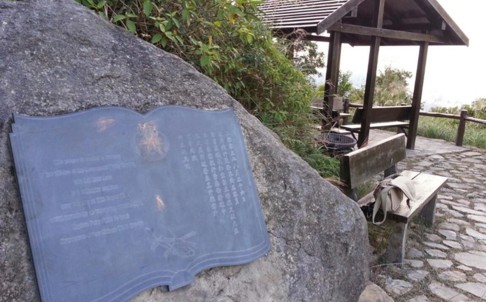
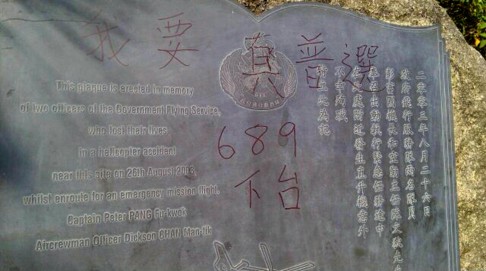
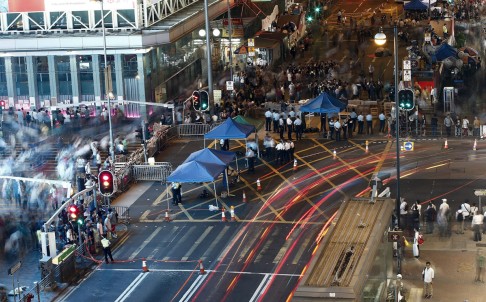
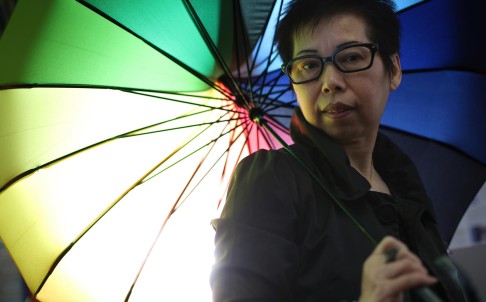
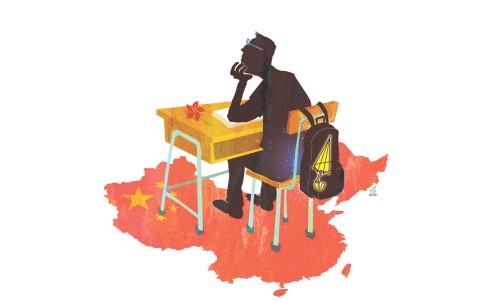
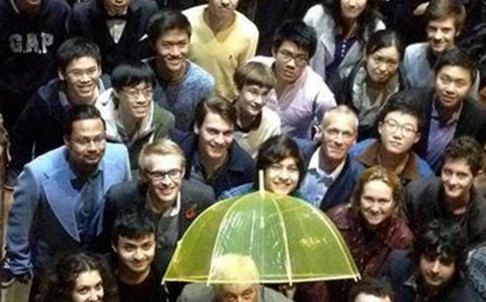
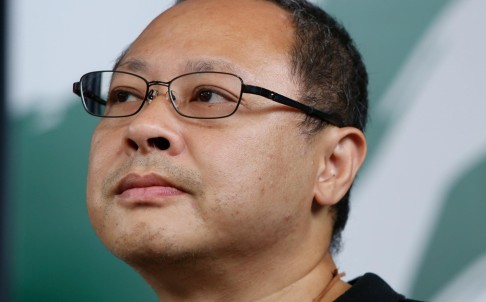
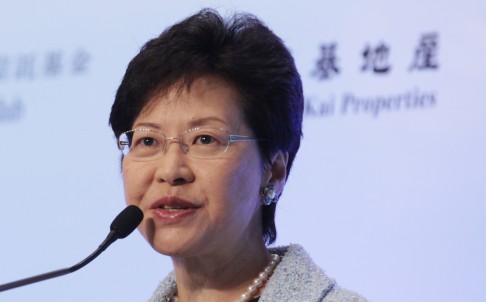
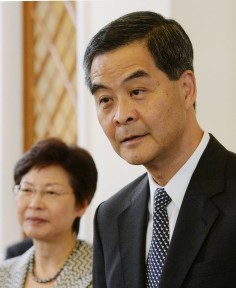
沒有留言:
張貼留言